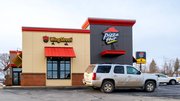Blog
Revisiting Restaurant 101: Three basics thatll make you pay attention again
June 23, 2011 by Rob Connelly
Our industry is experiencing a renewed emphasis on the core principles of business, likely due to the high volume, high turnover nature of the QSR category. Staying profitable and competitive can be a stressful juggling act of balancing customer needs, financial restrictions and resource limitations. Three key and equal components are necessary for success in the restaurant industry.
Reliability
Whatever the specific challenges in your QSR, the solution must be reliable. This applies to your operation, your equipment and your team. Management simply cannot afford anything less than a fully functional operation while turning out high volume. When you depend on one arm of your business to deliver – from staff to processes to ovens – the other arm needs to be there to support it.
Managing Expectations
Managing expectations with personnel and equipment is another cornerstone of a well-oiled QSR machine. The best operations keep simplicity in mind, while also setting the team up for success. The development of people, for instance, relies on finding the right people and helping them develop into agile, resourceful managers and leaders, able to deal with the fast, demanding restaurant environment. Likewise, in the quest to develop smoother universal operations, organizations must integrate tools and processes that make disastrous mistakes nearly impossible. In short, make it easy for your team to do whatever it is you're asking.
Efficiency
Efficiency, the final component in a well-run organization, has taken on an even larger role by allowing for higher production rates and the ability to give consumers what they want, when they want it. Constant attention to efficiency – not a fad or a trending topic, but in fact an ongoing business-critical element – is crucial in the restaurant business and keeps failure at bay. Within this principle, sustainability is a hot, current topic in the QSR world. Less energy absolutely means greater efficiency. At Henny Penny, one of our primary goals is to help customers save on oil, one of the largest energy expenditures in a restaurant.
To be efficient and keep costs down, many quick-serves are leaning toward smaller footprint stores, while at the same time working to produce annual sales of anywhere between $3 and $5 million per unit -- a sometimes daunting goal when big brands are dominating the category. To meet QSR giants head-on, your team must be capable of delivering high volume with uncompromised consistency. Kitchen equipment, for instance, must be compact; doing more in less space.
Reliability, managing expectations and efficiency are highly-intertwined components for any success story. Although this three-pronged approach involves a careful balancing act, the good news is these efforts come back to you in a positive way. When people, equipment and systems work cohesively and grow together, the overall QSR segment also grows into something better and reaps measurable rewards.
 ChatGPT
ChatGPT Grok
Grok Perplexity
Perplexity Claude
Claude








